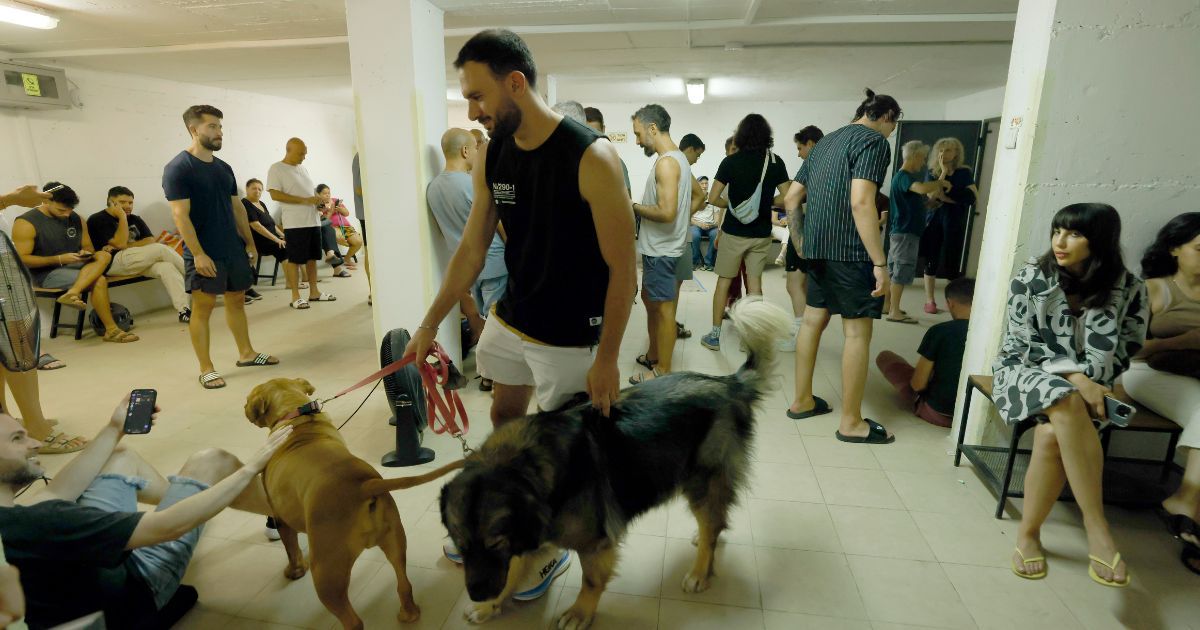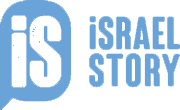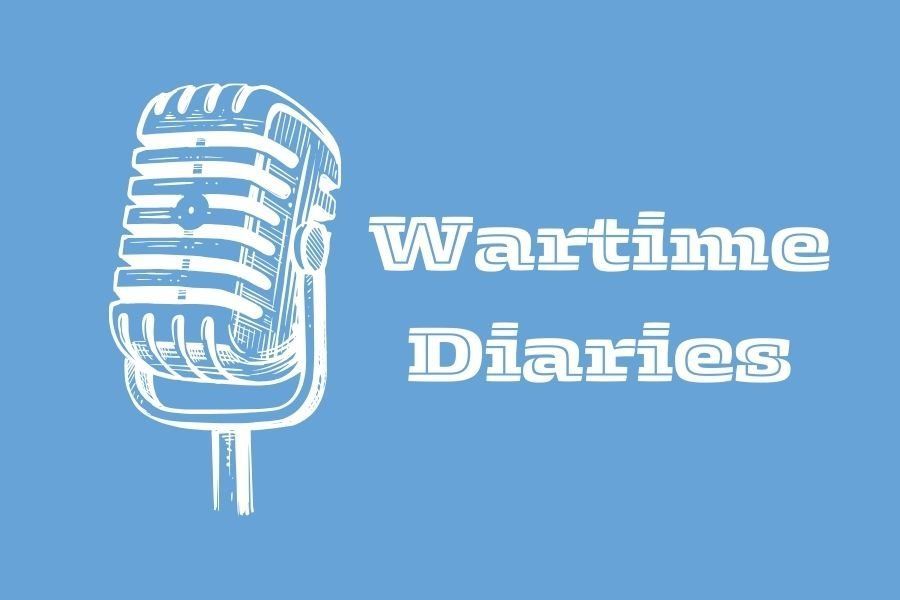
A snapshot from a war within a war, for the people on the other side.
Israel to Iran, Tel Aviv to Teheran
Once again, of course, we find ourselves living a new reality that is changing and developing by the minute. Shortly after the start of the attack, Israel’s Prime Minister got on TV and spoke directly to the Iranian people: “This,” he said, “is your opportunity to stand up and let your voices be heard.” Just in order to make things equal, we thought the people of Iran should also get the chance to hear our voices. Not those of politicians, pundits or IDF spokespeople, but rather those of regular Israelis, describing daily life in this war within a war. So between one bomb shelter dash and another, our reporting team took to the streets of various different Israeli cities and asked locals to speak – just like Bibi did – directly to folks in Iran.
Act TranscriptAdina Karpuj: If you could now speak to someone in Iran, what would you want them to know about you? Or what would you want to tell them?
Interviewee 1: If I spoke to someone in Iran?
Interviewee 2: Yeah, so I’m thinking about the Iranians…
Interviewee 3: Not the government?
Mitch Ginsburg: Not the government.
Interviewee 3: The people.
Mitch Ginsburg: The people.
Interviewee 4: Oh man, the past six nights have been sirens and waking up and no sleep and….
Interviewee 5: The bombs are really strong. We also anxious for our life.
Interviewee 6: Everything’s upside down.
Interviewee 5: Few times in a day we need to go to the shelter.
Interviewee 7: I mean, like that’s life during war and life under fire. You’re always running.
Interviewee 8: More red alerts at night, explosions.
Interviewee 9: In the day, we don’t have bombs, only in the night.
Interviewee 10: Last night, I was able to fall back asleep after the siren because I didn’t go back onto my phone.
Interviewee 11: There’s no school.
Interviewee 12: We are all around the home all day, every day.
Interviewee 5: We don’t do much. We’re not working.
Interviewee 1: I’ve felt quite aimless, purposeless, directionless, and that isn’t who I usually feel like.
Interviewee 5: It’s a little boring.
Interviewee 13: And it’s terrifying, but that’s our reality.
Interviewee 14: [In Hebrew] The situation is very hard. Interviewee 15: [In Hebrew] Today is my birthday but I don’t have anywhere to celebrate because of the war. It’s not good.
Interviewee 16: I feel like being alone in war is really scary, so I try to be with people all the time.
Interviewee 17: In Israel, we have every couple months, something that we need to get used to.
Adina Karpuj: And you guys are lying on the beach today? Interviewee 18: I’m trying to come to the beach to be like calm, because, you know, we’re doing the best we can.
Interviewee 19: We have to do something.
Interviewee 20: And there’s no time for me and the missus to be alone.
Interviewee 21: When you look out in the street, everything is calmer than ever.
Adina Karpuj: Do you have a shelter at home?
Interviewee 21: Yeah, but you know, household shelter – not something too complex.
Interviewee 22: My mommy is 60.
Interviewee 23: It’s hard for her to run to the bomb shelter.
Interviewee 24: We don’t have a shelter in my apartment, so we are sleeping in my mother’s with all our four kids and a dog.
Interviewee 25: We sleep in the miklat.
Mitch Ginsburg: The whole night?
Interviewee 25: Yeah.
Mitch Ginsburg: In pajamas?
Interviewee 25: Yeah. Mickey Mouse pajamas.
Interviewee 26: And mine are Batman.
Mitch Ginsburg: You have Batman pajamas, Benny?
Interviewee 26: Yeah.
Interviewee 27: [In Hebrew] We say scary stories.
Interviewee 28: Oh, you tell each other scary stories?
Interviewee 27: Yeah.
Interviewee 28: Yeah.
Mitch Ginsburg: Oh, like ghost stories?
Interviewee 27: Yes.
Interviewee 29: [In Hebrew] The truth is we don’t have a mamad. Nothing.
Interviewee 30: We know God is protecting us. Yes, yes, God is here in the equation. But I do believe that these are exactly the end times how they are supposed to look before a better time.
Adina Karpuj: Ahmad, if you could talk to someone in Tehran right now, what would you want to say to them?
Interviewee 31: Fuck you.
Adina Karpuj: Why?
Interviewee 31: Five minutes, it’s down miklat.
Adina Karpuj: You keep having to run because of the sirens?
Interviewee 31: Yes, yes, yes.
Interviewee 32: The little bit that we feel here running to bomb shelters like I imagine, it’s so much worse there so…
Interviewee 33: Our governments are stupid, but I believe in people and in peace, and I hope one day we can drink coffee in Iran, and you can drink coffee here. Stay safe.
Interviewee 34: Be safe.
Interviewee 35: Stay safe.
Interviewee 36: Peace and love! Peace and love!
Interviewee 37: I’m sorry that this is happening for you.
Interviewee 38: We love you very much.
Interviewee 39: We know that they want peace as much as we want peace.
Interviewee 40: We love you and love your culture.
Interviewee 41: We want peace. We want love.
Interviewee 42: We love them really much. We support them. We always love them.
Interviewee 43: Fuck them.
Interviewee 44: [In Hebrew] Cursed be their name and the name of their memory.
Interviewee 43: Because they killed Israeli.
Interviewee 44: [In Hebrew] Bad people who want to destroy the state.
Interviewee 43: You see all the history that killed Jewish people like the Shoah, you know?
Interviewee 44: [In Hebrew] To the nation of Iran, and to the whole world, I say.
Interviewee 43: That’s it.
Interviewee 44: [In Hebrew] That Israel is strong.
Adina Karpuj: That Israel is strong.
Interviewee 44: [In Hebrew] That nobody can beat us.
Adina Karpuj: That nobody can beat us.
Interviewee 44: [In Hebrew] Am Yisrael Chai.
Interviewee 45: We are don’t want war.
Interviewee 46: Israel! Israel! Very good! Bibi! Bibi! Bibi! Bibi!
Interviewee 47: How do you say? You mess with the wrong guy – Benjamin Netanyahu, the person that God touch him.
Interviewee 48: Bibi want peace. And now the people in Iran feeling good, I think, and Syria feel good, not Hezbollah.
Interviewee 47: And all the nation behind him. You don’t make deal with enemy. You never make deal with the enemy. Interviewee 48: We’re not enemies.
Interviewee 49: Who make the problem is just the leaders.
Interviewee 50: It’s not personal.
Interviewee 51: The people in Israel love you, but Khameini not good.
Interviewee 52: And we wish them quick freedom.
Interviewee 53: It’s their turn to go out of the street to break the regime from inside.
Interviewee 54: But they have to be brave.
Interviewee 55: I hope people hearing me in Tehran will be hearing it as free people and free from dictatorship and Islamism.
Interviewee 56: We’re just really tired. We’re not sleeping, and I’m sure people in Iran aren’t sleeping either. But you know, a woman is a woman, a mother is a mother. Children are scared. Sirens are sirens, like it doesn’t matter where they’re going off. I do hope and pray for you know, everyone in our region to have more freedom. If people throw away their hijabim. I saw one video of Iranians underground like singing and dancing and playing their Iranian music, which is apparently isn’t allowed. And yesterday we had a nice situation where one of our neighbors who teaches Israeli dance classes wrote everyone in their building “at five o’clock come to the park, I’m teaching the kids. Parents and kids can join.” And it was really fun, it was like a half an hour of dancing in the park.
Interviewee 57: It’s not war between the people. It’s war between, I guess, leaders and agendas.
Adina Karpuj: And what about to the same people in Gaza?
Interviewee 58: In Gaza? To die. To die, everyone in Gaza to die, really. It’s my… my opinion.
Interviewee 59: Iran is like very far and then it’s different with the Palestinians, because the Palestinians, they are very close, very intimate. The conflict is much closer.
Interviewee 60: [In Hebrew] It sounds bad but they deserve it. They deserve to die.
Interviewee 61: [In Hebrew] Also the kids, there’s nothing to do. However sad it is to say it, and it’s not something to be said lightly, we don’t have any mercy for them anymore.
Interviewee 62: Maybe in that sense, I’m in a minority right now in Israeli society. But still, is it OK to say during wartime I have sympathy?
Credits
Episode art photo credit: Yossi Zamir
The end song is Boker Tov Iran (“Good Morning Iran”) by Aviv Geffen.

 Wartime Diaries
Wartime Diaries

